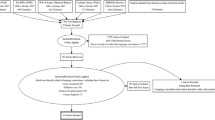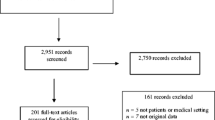Abstract
Workforce development initiatives designed to mitigate cancer health disparities focus primarily on oncologists rather than on primary care providers (PCPs) who could be better positioned to address the issue at the preventive and community levels. The purpose of this project was to assess primary care resident physicians’ self-perceived attitudes and comfort level in addressing cancer health disparities. Resident physicians in their first- through third-year of training in family, internal, preventive/occupational medicine, and obstetrics and gynecology (OB/GYN) at three academic centers responded to a 13-question survey in the spring of 2013. Descriptive and chi-square statistics were performed to analyze responses to (1) attitudes about cross-cultural communication and understanding, (2) knowledge about sources of cancer health disparities, (3) self-reported preparedness to provide cross-cultural cancer care and skills to manage specific situations, and (4) relevance of cancer-disparity education to clinical practice. A total of 78 (70.9 %) residents responded to the survey. Twenty three (29.5 %) of the respondents felt they did not understand the socio-demographic characteristics of their patients’ communities, and 20 (25.6 %) did not feel capable of discussing current cancer-related care guidelines when the patients’ personal beliefs conflict with their own. Few of the relationships between residency program and location with outcome measures met the criteria for statistical significance. Family medicine residents were the most likely to report in that it was hard to interact with persons from other cultures. As PCPs will play a key role in addressing cancer health disparities, effective educational opportunities in cancer care by primary care residents are warranted.
Similar content being viewed by others
References
“National Cancer Institute. Health disparities defined. Rockville, MD: U.S. Department of Health and Human Services, National Institutes of Health, National Cancer Institute”
Ward E, Jemal A, Cokkinides V, Singh GK, Cardinez C, Ghafoor A, Thun M (2004) Cancer disparities by race/ethnicity and socioeconomic status. CA: A Cancer Journal for Clinicians 54(2):78–93
Freeman HP (2003) Center to reduce cancer health disparities. Presentation to the National Cancer Advisory Board. National Cancer Institute. June 10, 2003. http://deainfo.nci.nih.gov/advisory/ncab/126_0603/Overview%20of%20Center%20to%20Reduce%20Cancer%20Health%
Taylor JD, Newman LA (2003) Increasing the pool of academically oriented African-American medical and surgical oncologists [1] (multiple letters). Cancer 98(12):2736–2737
Schmidt C (2009) Komen/ASCO program aims to swell ranks of minority oncologists. J Natl Cancer Inst 101(4):224–227
Benz JK, Espinosa O, Welsh V, Fontes A (2011) Awareness of racial and ethnic health disparities has improved only modestly over a decade. Health Aff 30(10):1860–1867
Kaiser Family Foundation (2014) National survey of physicians, part one: doctors on disparities in medical care. Accessed at www.kff.org/minorityhealth/20020321a-index.cfm on 29 Oct 2014
Commission to End Health Care Disparities (2014) Physicians are becoming engaged in addressing disparities: preliminary survey brief. Accessed at www.ama-assn.org/ama/pub/category/14969.html on 29 October 2014
Smedley BD, Stith AY and AR (2003) Nelson, Unequal treatment: confronting racial and ethnic disparities in health care. p. 782
Smith WR, Betancourt JR, Wynia MK, Bussey-Jones J, Stone VE, Phillips CO, Fernandez A, Jacobs E, Bowles J (2007) Recommendations for teaching about racial and ethnic disparities in health and health care. Ann Intern Med 147(9):654–655
Hasnain M, Massengale L, Dykens A, Figueroa E (2014) Health disparities training in residency programs in the United States. Fam Med 46(3):186–191
Battaglia MP (2008) “‘Nonprobability sampling,’” in Encyclopedia of survey research methods, SAGE Publications, pp. 523–26
Weissman JS, Betancourt J, Campbell EG, Park ER, Kim M, Clarridge B, Blumenthal D, Lee KC, Maina AW (2005) Resident physicians’ preparedness to provide cross-cultural care. JAMA 294(9):1058–1067
Lynch DC L, Pugno P, Beebe DK, Cullison SW, Lin JJ (2003) “Family practice graduate preparedness in the six ACGME competency areas: prequel”. Fam Med 35:324–329
Wickstrom GC, Kolar MM, Keyserling TC et al (2000) Confidence of graduating internal medicine residents to perform ambulatory procedures. J Gen Intern Med 15:361–365
Hoyert DL, Xu J (2012) Deaths: preliminary data for 2011. Natl Vital Stat Rep 61(6):1–51
“U.S. Cancer Statistics Working Group. United States cancer statistics: 1999–2011 incidence and mortality web-based report. Atlanta (GA): Department of Health and Human Services, Centers for Disease Control and Prevention, and National Cancer Institute; 20.”
Ubel PA (2010) Beyond costs and benefits: understanding how patients make health care decisions. Oncologist 15(1):5–10
Ramsey S, Schickedanz A (2010) How should we define value in cancer care? Oncologist 15(suppl1):1–4
Erwin RL (2010) Therapy for advanced stage cancer: what do patients want and expect: a patient advocate’s perspective. Oncologist 15(suppl1):11–12
Frintner MP, Mendoza FS, Dreyer BP, Cull WL, Laraque D (2013) Resident cross-cultural training, satisfaction, and preparedness. Acad Pediatr 13(1):65–71
Klein MD, Kahn RS, Baker RC, Fink EE, Parrish DS, White DC (2011) Training in social determinants of health in primary care: does it change resident behavior? Acad Pediatr 11(5):387–393
Jacobs EA, Kohrman C, Lemon M, Vickers DL (2003) Teaching physicians-in-training to address racial disparities in health: a hospital-community partnership. Public Health Rep 118(4):349–356
Krajewski A, Rader C, Voytovich A, Longo WE, Kozol RA, Chandawarkar RY (2008) Improving surgical residents’ performance on written assessments of cultural competency. J Surg Educ 65(4):263–269
O’Toole JK, Burkhardt MC, Solan LG, Vaughn L, Klein MD (2012) Resident confidence addressing social history: is It influenced by availability of social and legal resources? Clinical Pediatrics 51(7):625–631
Taylor AI, Buckner BA, Walker C, “Training residents to address cancer health disparities,” Educ. Innov., pp. 72–75
Park ER, Wolfe TJ, Gokhale M, Winickoff JP, Rigotti NA (2005) Perceived preparedness to provide preventive counseling reports of graduating primary care residents at academic health centers. Journal of General Internal Medicine 20(5):386–391
Hoffman RM, Elmore JG, Fairfield KM, Gerstein BS, Levin CA and Pignone MP (2014) “Lack of shared decision making in cancer screening discussions. Results from a national survey,” American Journal of Preventive Medicine
Susanibar HL, Thrush S, Khatri CR N, “Cancer survivorship training: a pilot study examining the educational gap in primary care medicine residency programs,” J Cancer Surv, vol. 8, no. 4, pp. 565–70.
Acknowledgments
Dr. Mejia de Grubb received a support from the American Psychological Association’s Socioeconomic Status Related Cancer Disparities Program (SESRCD) mini-grant and the Preventive Medicine Residency Program at Meharry Medical College.
Ethical Approval
Meharry Medical College Institutional Review Board
Author information
Authors and Affiliations
Corresponding author
Rights and permissions
About this article
Cite this article
Mejia de Grubb, M.C., Kilbourne, B., Zoorob, R. et al. Resident Physicians and Cancer Health Disparities: a Survey of Attitudes, Knowledge, and Practice. J Canc Educ 31, 541–546 (2016). https://doi.org/10.1007/s13187-015-0846-8
Published:
Issue Date:
DOI: https://doi.org/10.1007/s13187-015-0846-8




